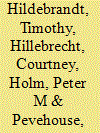| Srl | Item |
| 1 |
ID:
075225


|
|
|
|
|
| Publication |
2006.
|
| Summary/Abstract |
The Kantian peace research program has produced generally robust results on the role of democracy and international trade in reducing the risk of international conflict. Yet a key theoretical linkage in the Kantian argument, that of international governmental organizations (IGOs) to peace, has proved less robust and more problematic. We propose a new theoretical perspective focusing on the contributions of a particular kind of IGO-that composed largely of democracies-to peaceful conflict resolution through aiding credible commitments, dispute settlement, and socialization to peaceful behavior. A set of statistical tests provides strong support for our hypotheses that such densely democratic IGOs are far more likely to engender peaceful relations between members than are more homogenous IGOs. This is true when controlling for regime type, interdependence, and several realist-oriented influences. The peace-inducing influences affect both democratic and nondemocratic member states.
|
|
|
|
|
|
|
|
|
|
|
|
|
|
|
|
| 2 |
ID:
124578


|
|
|
|
|
| Publication |
2013.
|
| Summary/Abstract |
The debate around humanitarian intervention and the responsibility to protect generally concerns a collective action problem on the international level: motivating states to participate in a multilateral coalition to stop a mass atrocity. This debate presupposes that states enjoy a domestic consensus about their rights and responsibilities to intervene. This article reconsiders this assumption and examines the sources of domestic political will for intervention, particularly the role of partisanship, ideology, and public opinion on Congressional members' willingness to support US intervention for humanitarian purposes. We analyze several Congressional votes relevant to four episodes of US humanitarian intervention: Somalia, Haiti, Bosnia, and Kosovo. We find that public support for humanitarian intervention increases Congressional support and that other political demands, primarily partisanship and ideological distance from the president, often trump the normative exigencies of intervention. Our findings shed light on the domestic political dynamics behind humanitarian intervention and can help explain why some recent humanitarian missions have proceeded without seeking Congressional approval.
|
|
|
|
|
|
|
|
|
|
|
|
|
|
|
|